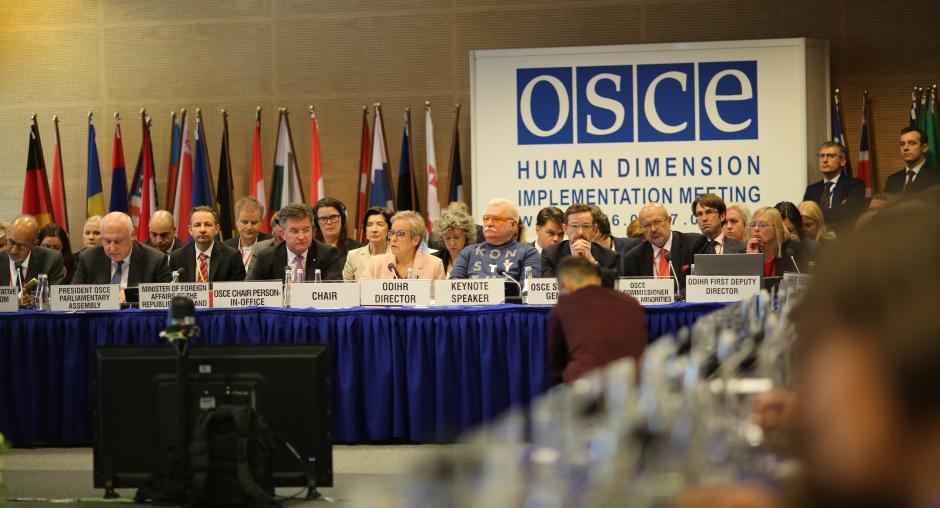Kazakhstan is known not only for its lead in the issue of multi-lateral nuclear disarmament, but also for its significant contribution to ensuring dialogue between religions existing on the Earth, having founded in 2003 the permanent international interfaith institute “Congress of Leaders of World and Traditional Religions”.
In June 2021, in the capital of Kazakhstan, Nur-Sultan, the 7th meeting on the topic “Social Responsibility of Religious Leaders and Communities in the Modern World” is to be be held.
These and other significant aspects relating to the observance of religious freedom were touched upon by human rights defenders on the sidelines of Human Dimension Implementation Meeting 2019 of the Organisation for Security and Cooperation in Europe (OSCE) Bureau for Democratic Institutions and Human Rights, which took place in Warsaw from September 16-27th.
Vitaliy Pak, a member of the governing council of the Union of Pentecostal Churches of Kazakhstan, pastor of the “Source of Life” Church in Almaty, informed the forum participants about the successful dialogue of evangelical communities with authorised state bodies within the framework of the relevant memorandum of cooperation and understanding between the Union.
According to him, problems of interaction between the churches and government tend to be of a domestic nature or are associated with improper actions by both individual officials and clergymen. Sometimes, he stated, conflicts, and even wrongdoings, are justified in the name of God.
Recently, for example, three leaders of the Protestant “New Life” Church in Kazakhstan were convicted of fraud. These actions against individuals posed no threat whatsoever to the church itself, however they were presented as “religious persecution”.
The New Life Church is an evangelical institution. It attracted serious attention when in 2006 the founding pastor of its Colorado Springs operation, Ted Haggard, faced accusations that he had had sex with a male prostitute, and made payments to a young male church member with whom he who had a relationship with. Despite admitting his guilt he continues to serve as a pastor in the church to this day.
Paradoxical it may seem, but within such “churches” traditional values of tolerance, loyalty and the principle of non-intervention can be subverted leading to separation of families due to refusal to follow individual spiritual teachings of one of the family members, restriction of fundamental freedoms and human rights by fanatical clergy, taking possession of property “for the good of the church”, and even going so far as concealing the facts of child abuse.
Minimising such subversion of important institutions and holding offenders to account, and most importantly protecting victims is the duty of any state. There needs to be an understanding of how important it is to find a balance. Tolerance must not become indifference, nor should it become blind permissiveness. Traditional values should not be derided as archaism.
The head of the “Akzhaiyk” Human Rights Research Centre, Kanagat Nurmukhambetov from the city of Uralsk, marked the departure of the Kazakh authorities from arbitrary application of the law by redirecting punitive measures to explanatory steps, which is confirmed by a decrease in the statistics on penalties imposed on religious minorities for violating religious laws.
The problem of increasing conflicts between secular society and individual religious minorities, for example, Jehovah’s Witnesses, which, Nurmukhambetov postulates, adversely affects interfaith harmony and public safety in general, was discussed at the OSCE meeting.
He voiced recommendations to the Governing Council of the Witnesses on the revision of activities in Kazakhstan, taking into account the mindset and traditions of the local population.
Also noteworthy in this context is the participation at the OSCE of the head of the TerraLibera public foundation, himself an ex-elder of the Jehovah’s Witnesses community, Yergali Abishov, who announced his plans to protect citizens, former members of the Jehovah’s Witnesses church, accusing the leadership of this religious organisation of corrupting minors, as well as demanding a degree of loyalty that disrupts family, social, and economic responsibilities.
Without any doubt, intolerance and discrimination in society is a global problem that modern all democratic and enlightened societies seek to address as a matter of priority. However, the likelihood of such negative manifestations surely depends on the behaviour of participants in religious and other organisations themselves.
However, in any conditions, dialogue is, and must remain, at the forefront, to ensure timely and amicable solutions to societal conflict, and to prevent the subversions of our institutions as have been discussed.




